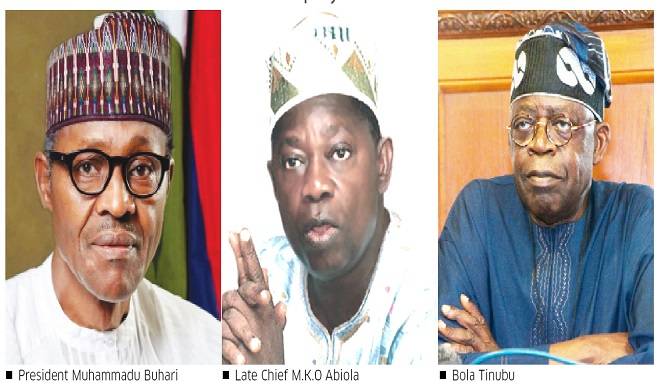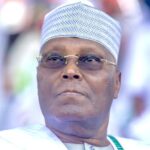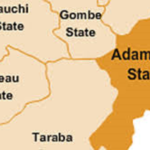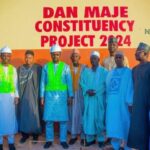
In politics, pandering refers to the insincere, opportunistic appeasement of a group of people, usually a large electoral bloc, for the sole purpose of winning their votes. President Muhammadu Buhari’s declaration of June 12 as Nigeria’s new “Democracy Day” and the conferral of posthumous awards to the late MKO Abiola and the late Gani Fawehinmi, commendable as they are, are classic cases of pandering. The pandering is carefully calculated to reverse the noticeable diminution of Buhari’s political capital among Yoruba voters ahead of the 2019 presidential election.
From 2003 when Buhari started running for president to 2011, he had never won Yoruba, Igbo, Northern Christian, and Southern ethnic minority votes; Northern Muslim votes, which he has always won, were never enough to make him president. In 2015, he re-invented himself as a cosmopolitan nationalist and won Yoruba and Northern Christian, or Middle Belt, votes in addition to the votes from his traditional base.
Apart from his lusterless and mediocre performance as president, one of the immediate triggers for the dramatic waning of Buhari’s appeal among Yoruba voters was his politically inexpedient extolment of the late General Sani Abacha, the persecutor of the cultural and political icons of the Yoruba people-MKO Abiola, Gani Fawehinmi, Wole Soyinka, and so on. On May 22, 2018, Buhari told supporters who visited him at the Presidential Villa that whatever people might think of Abacha, they had to concede that he would go down in the records as someone who built roads, hospitals, and schools.
This high praise of Abacha provoked mass outrage in Yoruba land, even among Buhari supporters, and threatened to erode the last vestige of goodwill he had in the region.That was particularly politically precarious, and here is why. Buhari has now irretrievably lost the Northern Christian vote. If he loses the Yoruba vote, he would be down to his pre-2015 Northern Muslim constituency. So he needed to do something radical to appease Yoruba voters.
His strategists advised him to go for the ultimate emotional appeasement: Declare June 12 “Democracy Day,” which it already is in the Southwest; honor MKO Abiola, Gani Fawehinmi, and other Yoruba icons; apologize for the voiding of the June 12 election; and even go so far as to make the outrageously inaccurate claim that “June 12, 1993 was far more symbolic of democracy in the Nigerian context than… October 1,” the day of Nigeria’s independence from British colonialism.
Buhari did this at no personal political cost. His political base will always stand by him, irrespective of what he does. Any other northern Muslim politician who does what Buhari did would have alienated and lost his base. But Buhari’s supporters interpret this move as a “necessary evil” to get the Southwest to reelect him.
The president’s tactical emotional and political tokenism seems to have worked-at least so far. I have nothing against the Yoruba elite-and the voters they influence-for being suckers for Buhari’s appeasement. We are all suckers for something. And our emotions are a valid component of our being. June 12 and MKO Abiola are obviously tender spots for many Yoruba people-and that’s entirely reasonable.
However, while it’s legitimate to be a sucker for emotional appeasement, it helps to be self-aware of the potential for costly naivety. I’m glad that Professor Soyinka’s public pronouncements show evidence of this self-awareness. On June 12, for instance, he told President Buhari to his face, “You cannot honour Abiola in one breath and admire his tormentor in another breath.”
Other Southwest political elites aren’t this clearheaded, unfortunately. Femi Falana, for instance, in his giddy excitement over Buhari’s pandering to the Yoruba, chose the path of self-centered intellectual dishonesty to defend Buhari’s clearly unconstitutional declaration of June 12 as Democracy Day. “It is crystal clear that the president is not required by law to seek and obtain the approval of the National Assembly before declaring a public holiday in the country,” Falana said on June 7.
A week later, Buhari’s Attorney General and Minister of Justice, Abubakar Malami, undercut Falana’s duplicity and helped to underscore the insincerity in the declaration of June 12 as Nigeria’s new Democracy Day. “As it relates to public holidays, there is truly a Public Holiday Act,” Malami said.“The Act can be amended and the process of amendment has been put in place. When the Act has been fully amended, the declaration of the President will come into effect. It is a declaration of intention, a declaration of desire and that will eventually be given effect with the amendment of the existing law.”
In other words, contrary to what Falana said, President Buhari has no constitutional powers to unilaterally declare June 12 as Democracy Day; he needs to amend the Public Holiday Act before his declaration can become legal. As always, for political reasons, the president shot before he targeted. If this wasn’t pandering, the president should have first set the process for the amendment of the Holiday Act in motion before announcing his “declaration of intention” to make June 12 the new “Democracy Day.”
As it is now, it is entirely within the realm of possibility that the legal and legislative processes required to amend the Holiday Act to make June 12 Nigeria’s Democracy Day won’t be completed before the 2019 presidential election. It is also conceivable that if Buhari wins a second term with votes from the Southwest, there would no longer be any talk of June 12 as Democracy Day. The president would shift the burden to the National Assembly, which won’t care for it. Only Yoruba states that already celebrate June 12 as a democracy day would continue to do so.
Buhari’s June 12 pandering is eerily similar to his faux sartorial and religious inclusivity in the run-up to the 2015 election. He donned the symbolic garbs of various ethnic groups and even attended church services. This was complemented with the deliberately false Internet story that he countenanced the marriage of one of his daughters to an Igbo Christian- and such like fabrications. Pastor Tunde Bakare even recalled, falsely it turned out, that Buhari once exclaimed “Jesus!” during a moment of intense emotion.
So the pretense to cultural and religious broadmindedness coalesced with intentionally false internet narratives to construct an image of a radically transformed Buhari who was no longer beholden to narrow ethnic, regional, and religious allegiances. It didn’t take long for this elaborate fraud to unravel.
During his first visit to the US shortly after his election, Buhari said he won’t dispense equal favors to people who gave him only 5 per cent of their votes and those who gave him 97 per cent of their votes. Although, he immediately walked back on the statement, his administration has shown no genuine commitment to uniting the country outside mouthing pious, disingenuous bromides about the indivisibility of the country.
Buhari may well get a second term with the help of votes from the Southwest. But one thing is as certain as tomorrow’s date: he will spectacularly fall out with the Yoruba elite whose support he’s bending over backwards to court now. He’d no longer have a need for them after 2019 and might even remember that they betrayed him in 2011. These same people would then turn against not just Buhari but the entire North. If we’re alive till then, we’d remind them that they are complicit in their own fate. An Italian proverb says, “When a man deceives me once, it is his fault; when twice, it is mine.”

 Join Daily Trust WhatsApp Community For Quick Access To News and Happenings Around You.
Join Daily Trust WhatsApp Community For Quick Access To News and Happenings Around You.


